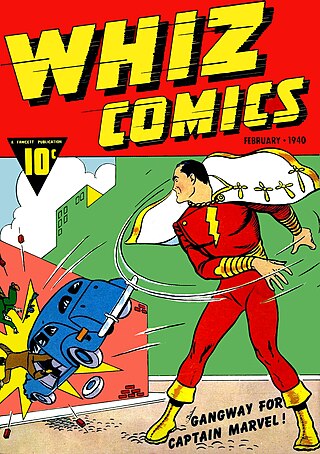
A superhero or superheroine is a stock character who typically possesses superpowers or abilities beyond those of ordinary people, is frequently costumed concealing their identity, and fits the role of the hero; typically using their powers to help the world become a better place, or dedicating themselves to protecting the public and fighting crime. Superhero fiction is the genre of fiction that is centered on such characters, especially, since the 1930s, in American comic books, as well as in Japanese media.
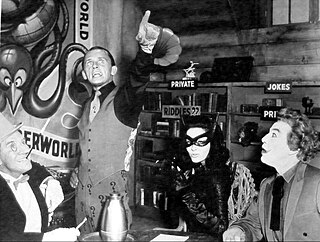
A supervillain or supercriminal is a variant of the villainous stock character. It is sometimes found in comic books, and may possess superhuman abilities. A supervillain is the antithesis of a superhero.
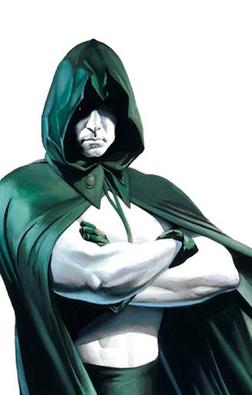
The Spectre is the name of several antiheroes who appear in American comic books published by DC Comics. The original version first appeared in More Fun Comics #52. The character was created by Jerry Siegel and Bernard Baily although some sources attribute creator credit solely to Siegel, limiting Baily to the artist assigned to the feature.

The Tick is a superhero created by cartoonist Ben Edlund in 1986 as a newsletter mascot for the New England Comics chain of Boston-area comic book stores. The character is a parody of American comic book superheroes.

Black Orchid is the name of four superheroines published by DC Comics. The original version of the character first appeared in Adventure Comics #428.

Giovanni "John" Zatara, simply called Zatara, is a fictional magician and superhero appearing in American comic books published by DC Comics. The character first appeared in Action Comics #1 in 1938 during the Golden Age of Comic Books, making him one of DC Comics' oldest characters.
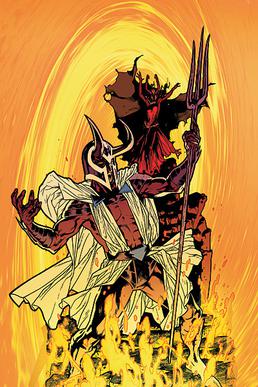
Blaze and Satanus are twin fictional demonic siblings appearing in American comic books published by DC Comics. Blaze first debuted in Action Comics #655, created by Roger Stern and Brett Breeding and first pencilled by Bob McLeod. Later, Satanus was created by Brett Breeding and debuted in The Adventures of Superman #493 by Jerry Ordway and Tom Grummett. The twin duo originally starred as Superman villains associated with the supernatural but were later revealed to be the children of the Wizard Shazam, Blaze respectively depicted as a powerful enemy of the Marvel Family.

Nick Fury's Howling Commandos was an American comic book series published by Marvel Comics. Running six issues before its cancellation and cover-dated December 2005 to May 2006, the series featured a fictional team set in the Marvel Universe, consisting of supernatural characters employed as a unit of the espionage agency S.H.I.E.L.D.

Argentine comics are one of the most important comic traditions internationally, and the most important within Latin America, living its "Golden Age" between the 1940s and the 1960s. Soon after, in 1970, the theorist Oscar Masotta synthesized its contributions in the development of their own models of action comics, humor comics and folkloric comics and the presence of other artists.

Anteojito y Antifaz, mil intentos y un invento is a 1972 Argentine animated comedy-drama film written and directed by Manuel García Ferré. The film premiered in Argentina on September 14, 1972. It was re-released on July 12, 2001.
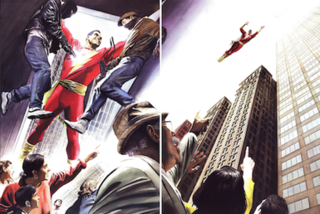
A superpower is a special or extraordinary superhuman ability that is greater than what is considered normal. Superpowers are typically displayed in science fiction and fantasy comic books, television programs, video games, and films as the key attribute of a superhero. The concept originated in American comic books and pulp magazines of the 1930s and 1940s, and has gradually worked its way into other genres and media.
José María Massaroli is an Argentine comics artist, born in Ramallo Partido.
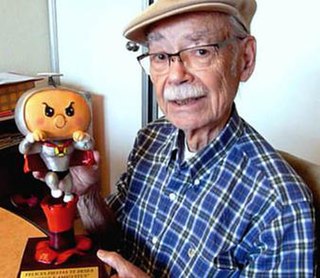
Manuel García Ferré was a Spanish Argentine animation director and cartoonist.

Superhero fiction is a subgenre of speculative fiction examining the adventures, personalities and ethics of costumed crime fighters known as superheroes, who often possess superhuman powers and battle similarly powered criminals known as supervillains. The genre primarily falls between hard fantasy and soft science fiction in the spectrum of scientific realism. It is most commonly associated with American comic books, though it has expanded into other media through adaptations and original works.
The Wizard is a superhero created by Will Harr and Edd Ashe Jr. for MLJ Comics, which later became Archie Comics. He first appeared in Top-Notch Comics #1 in December 1939, and was one of the headliners of that title until its cancellation in 1944. He was one of the earliest superhero characters to appear after the debut of Superman in 1938.
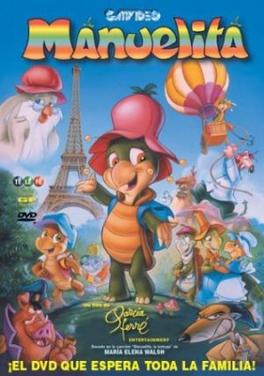
Manuelita is a 1999 Argentine animated adventure comedy-drama film directed by Manuel García Ferré. It was Argentina's official Best Foreign Language Film submission at the 72nd Academy Awards, but did not manage to receive a nomination. It is also the first ever animated film by Scope, and the first ever family movie by Scope.

Kaldur'ahm, or Kaldur for short, is the superhero codenamed Aqualad and Aquaman in media published by DC Entertainment. The character was created by Brandon Vietti, Greg Weisman and Phil Bourassa for the television series Young Justice, and voiced by Khary Payton. His name is a reference to the character Cal Durham, formerly a henchman of the supervillain Black Manta who was sent to infiltrate Atlantis, but defected to the Atlanteans. While originally developed for television, DC quickly adapted the character to its mainstream comic books, with Geoff Johns and Ivan Reis' re-interpreting the character. For television, creators were able to tell a story where Aqualad had known and worked with Aquaman for many years, while the comic book version had to be introduced to Aquaman and readers at the same time, meaning aspects of his backstory had to be changed.
The Adventures of Hijitus is an Argentine animated series created in 1967 by Spanish cartoonist Manuel García Ferré. It was the first animated series in Latin America that was made for television, and has been considered the most successful series in the history of Latin American cartoons.
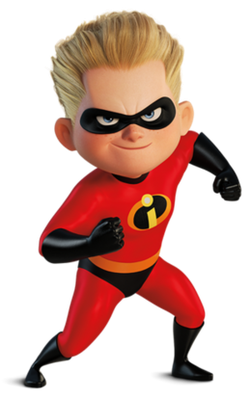
Dashiell "Dash" Robert Parr is a fictional character who appears in Pixar's animated superhero film The Incredibles (2004) and its sequel Incredibles 2 (2018). The character is voiced by Spencer Fox in the first film and Huckleberry Milner in the second film. Restless, relentless and curious, Dash sports a hearty sense of adventure and a boundless supply of energy. Born with the remarkable power of superhuman speed, he longs to be free to use his powers at his leisure, and chafes against the admonishment by his parents, in particular his mother, that his powers must be kept a secret.
















